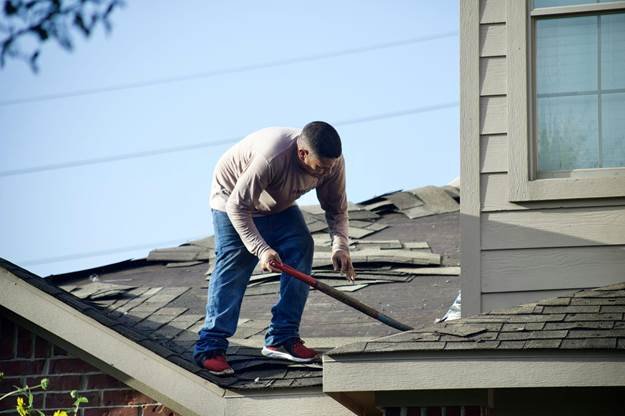Your Guide to Roofing Warranties
A new roof is one of the most significant investments you'll make in your home, with costs often ranging from $5,704 to over $12,496, according to Forbes Home. With that level of financial commitment, the warranty protecting it is not just a piece of paper; it's a critical component of your home's long-term security. Yet, the language and terms surrounding roofing warranties can be complex. This guide is designed to clarify the details, explaining what is covered, what isn't, and how to ensure your protection remains valid for decades. Understanding your roof warranty is the first step in safeguarding your investment.
Table of Contents
The Two Pillars of Roof Protection
Every comprehensive roof protection plan is built on two distinct warranties that work together: the manufacturer's warranty and the contractor's workmanship warranty. Understanding the difference is crucial.
What is a Manufacturer's Warranty?
This warranty comes directly from the company that produced your roofing materials, such as your shingles or metal panels. It protects you against defects in the products themselves.
Coverage: It covers premature failure due to a manufacturing flaw. For example, if a batch of shingles begins cracking or losing granules years before it should, this warranty would apply.
"Limited Lifetime" Explained: The term "lifetime" can be misleading. It typically refers to the period a single-family homeowner owns the house, not the owner's literal lifetime.
Prorated vs. Non-Prorated: Most standard warranties have a non-prorated period (often 5-10 years) where the manufacturer covers 100% of the cost of defective materials. After this period, the coverage becomes prorated, meaning its value decreases each year.
What is a Contractor's Workmanship Warranty?
This warranty is provided by the roofing company that installed your roof, like Creative Roof Solutions. It is arguably the more critical of the two, as improper installation is the leading cause of premature roof failure.
Coverage: This protects you from leaks and other issues caused by installation errors, such as improperly fastened shingles, incorrect flashing installation, or poor sealing.
Duration: Workmanship warranty periods vary by contractor, typically ranging from 2 to 10 years, with some exceptional companies offering longer-term or lifetime protection.
The Contractor's Importance: A product warranty is useless if the roof is installed incorrectly. Your choice of a reputable, experienced residential roofing contractor is your first and best line of defense.
Warranty Comparison at a Glance
| Feature | Manufacturer Warranty | Contractor Workmanship Warranty |
|---|---|---|
| Who Provides It? | The product manufacturer (e.g., Owens Corning) | Your roofing contractor |
| What It Covers | Defects in the roofing materials | Errors made during installation |
| Typical Duration | 25-50 years ("Limited Lifetime") | 2-10 years (or more) |
| Key Exclusions | Installation errors, storm damage, lack of maintenance | Material defects, storm damage, unauthorized alterations |
What Your Warranty Actually Covers
A warranty document is a legal agreement with specific terms. Knowing what is typically included—and more importantly, excluded—can save you from future surprises.
Reading the Fine Print: Common Inclusions and Exclusions
While every policy differs, most roofing warranties follow a general pattern.
Typically Covered:
Premature cracking, blistering, or granule loss on shingles due to a manufacturing defect.
Leaks directly resulting from an installation error (covered by workmanship warranty).
Almost Never Covered:
Damage from high winds, hail, or falling tree limbs ("Acts of God").
Leaks caused by ice dams.
Damage resulting from unauthorized alterations or repairs.
Issues caused by a lack of routine roof maintenance.
The Gold Standard: Enhanced Manufacturer Warranties
The best protection available comes from enhanced or extended warranties offered by manufacturers like Owens Corning and CertainTeed. These premium warranties offer superior, non-prorated coverage but have strict requirements.
How to Qualify: You must use a complete roofing system from a single manufacturer (shingles, underlayment, ventilation, etc.) and have it installed by a contractor who is certified by that manufacturer.
Key Benefit: These warranties often provide decades of non-prorated coverage that includes not only the cost of materials but also the labor to fix the problem, tear-off, and disposal fees. This represents the most complete peace of mind available.
How to Keep Your Warranty Intact
A roof warranty is not a "set it and forget it" agreement. Certain actions can void your coverage entirely. Here are five common mistakes to avoid.
Improper Attic Ventilation: A poorly ventilated attic can superheat, essentially "baking" your shingles from below and causing them to fail prematurely. This is a common reason for warranty claim denial.
Unauthorized Alterations: Never allow a third party to cut into your roof to install a satellite dish, skylight, or even solar panels without first consulting your original roofing contractor. Improper installation can easily void your warranty.
Pressure Washing: Pressure washing can strip shingles of their protective granules, severely shortening their lifespan and voiding the manufacturer's warranty.
Neglecting Maintenance: Your roof requires periodic inspection and cleaning. Allowing moss to grow or gutters to clog can lead to water damage that is considered a maintenance issue, not a warranty claim. Keep your rain gutters clear.
DIY Repairs: Attempting to fix a small issue yourself can create a larger problem and will almost certainly void your workmanship warranty. Always call a professional.
Transferring Your Warranty: A Powerful Selling Point
If you plan to sell your home, a transferable roof warranty can be a significant asset. Most standard manufacturer warranties and high-quality workmanship warranties are transferable to the next homeowner, usually just once.
The process typically requires notifying the manufacturer and/or contractor in writing within a specific window (e.g., 30-60 days after the property sale) and may involve a small administrative fee. A well-documented, transferable warranty provides tangible value and confidence to potential buyers.
Filing a Claim and Answering Your Top Questions
If you believe there is an issue with your roof, a calm and methodical approach is best.
What to Do if You Suspect a Roof Problem
Document the Issue: Safely take clear photos of the problem area from both inside (e.g., ceiling stains) and outside, if possible. Note the date you first noticed the issue.
Contact Your Original Contractor: Your first call should always be to the company that installed your roof. They can assess whether the problem is related to installation or a potential material defect.
Initiate the Claim: If the issue is determined to be a material defect, your contractor will help you start the claims process with the manufacturer.
Frequently Asked Questions
Will installing solar panels void my roof warranty? It can if not done correctly. To preserve your warranty, it's best to have the same certified roofer who installed your roof also handle the solar panel installation, or at least work closely with the solar company to ensure proper mounting and sealing techniques are used.
What happens if my roofing contractor goes out of business? This is why choosing an established, reputable company is so important. If your contractor closes, your workmanship warranty disappears with them. However, your manufacturer's warranty on the materials remains valid. An enhanced manufacturer's warranty can provide extra protection in this scenario, as it may cover labor costs for material defects.
How long does a workmanship warranty really need to be? Most installation errors will become apparent within the first one to two years, often after the first cycle of heavy rain or snow. A warranty of 5-10 years from a trustworthy commercial or residential roofer provides excellent, long-term assurance.
Is a "lifetime" warranty really for my entire life? No. As defined by most manufacturers, "lifetime" applies as long as you, the original homeowner, own the property. For subsequent owners, the coverage period is typically reduced and prorated.
Your roof warranty is a partnership between you, your contractor, and the material manufacturer. While the document provides a safety net, the true key to a long-lasting roof is quality materials installed with expert craftsmanship. The best warranty is the one you never have to use.
Ready to secure your investment with a roof and warranty you can trust? Contact Creative Roof Solutions today for a comprehensive inspection and a clear explanation of your protection options.




